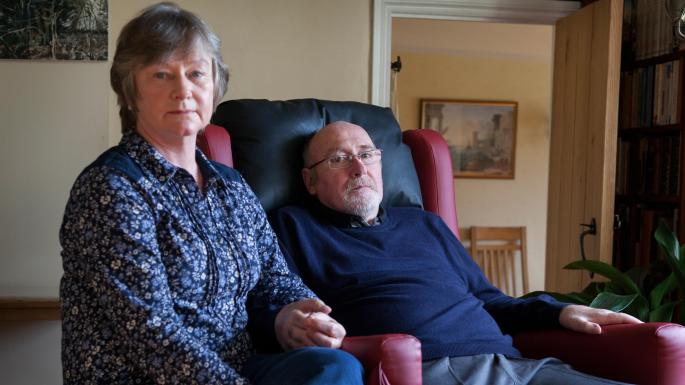
By
[T]he daffodils are in full bloom outside the cozy Shropshire cottage where Noel Conway prepares for his day in court, spring sunshine streaming through the window.
Typing has become too difficult for the 67-year-old. He can just about manage with a specially-adapted mouse, but has invested in the eye-gaze technology made famous by Stephen Hawking. He is finding it hard going. “I’m so slow. I don’t know how he ever wrote a book using it. But I am preparing for what I know lies ahead,” he says.
This highly articulate, retired adult education lecturer knows it is only a matter of time before he loses his powers of speech. Like Professor Hawking, Mr Conway has motor neurone disease. Unlike the physicist, he won’t live with the illness for years to come. This will probably be his last spring.
It is not death that alarms him but the process of dying. The suffering in the last months and weeks of life for those with MND is notorious. Bit by bit, neurons stop communicating with one another, resulting in difficulty moving, speaking, swallowing and eventually breathing. Mr Conway wants to have the right to say when enough is enough and die in some degree of comfort.
He cannot take his own life — he has not got the strength, and under the current law no one can help him die without risking prosecution and imprisonment. Which is why tomorrow Mr Conway and his wife Carol will take a judicial review to the High Court. Despite his poor health, he will be there in person.
Diagnosed in November 2014, his illness has progressed rapidly, particularly in the past few months. Having lost the power and feeling in his arms in the first stages of the illness, in November the former mountaineer, skier and cyclist caught an ordinary winter bug. “That finished off what strength I had left in my legs,” he said. He now relies on a hoist and uses a power wheelchair.
He can no longer clean his teeth or scratch his head. He gets stuck on his back in bed at night and has to call out for his wife to help him. He wears a ventilator much of the time.
On the plus side, he is still able to talk and does so with intelligence and passion. And he can still eat and drink with help, and the use of a one-way valve straw. “I draw the line at wine, though. I’m not drinking that out of a tumbler and straw.” He refused to have a tube fitted into his stomach for feeding. “The day I cannot eat and drink . . . well I don’t want to be here anymore.”

However, it is the thought of not being able to move, an inevitability, being trapped in a totally paralysed body, that he finds most harrowing. “I know that when I’m absolutely rigid and immobile, can’t speak or breathe, I want to be able to say right, it’s time to go,” he says. “I do not want to be trapped in a tiny cell inside a pyramid with the sides closing in on me.”
That fear prompted Mr Conway to join Dignitas, the Swiss clinic which offers medically-assisted dying to the ill and disabled. More than 40 Britons end their lives there each year and no one has ever been prosecuted for helping a loved one make the journey there. It is, in effect, a legal form of assisted suicide for the wealthy.
“It was a relief to join. I felt I needed to take control,” he said.
However, he feels there is something fundamentally wrong if the wealthy have an option that no one else has. His entire life he has tried to fight for those who have had no voice. He was a councillor in Blackburn in his early 20s and during his career championed the cause of those who missed out on education first time round to have another chance.
“Only a small number of people can afford Dignitas,” he says. “The fees are about £7,500 and you have to get there on top of that. So it is prohibitively expensive for many. It is inequitable.” It is this passion for fairness that has led him to take his case to court.
Supported by the campaign group Dignity in Dying and having raised £30,000 through crowdfunding, his legal team will ask the court to declare that the blanket ban on assisted dying under the Suicide Act 1961 is contrary to his human rights. They will argue that as a terminally ill, mentally competent adult, his right to a private life includes the right to make decisions on the end of his life.
He has a good case.
The most recent assisted-dying case was taken by Tony Nicklinson, who suffered locked-in syndrome. Although the Supreme Court finally rejected his case, judges were sympathetic and urged MPs to consider changing the law. Mr Conway will argue that they have not done this in any serious way despite polls suggesting overwhelming public support for change. MPs held a brief Friday afternoon debate on a private members’ bill on the issue in September 2015, then voted it down.
“I must say, I am appalled at the way a considerable number of MPs did not even engage with the issue, which is a very serious one for our time,” Mr Conway says.
Complete Article HERE!
